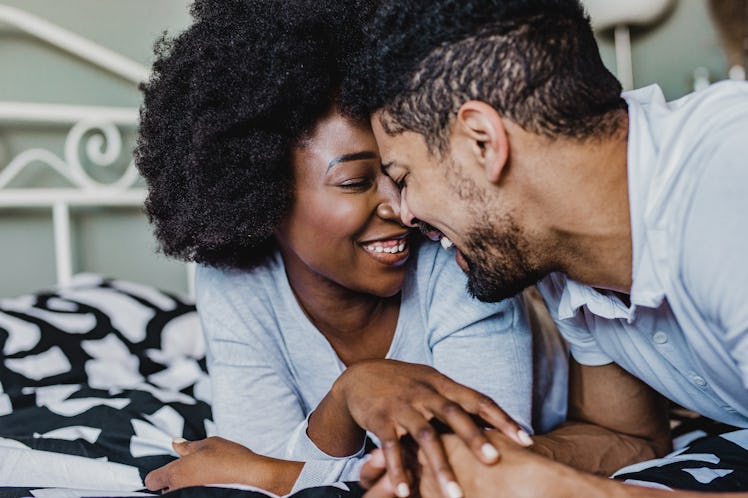
Here's What You Need To Know About Sex During The Coronavirus Outbreak
You've probably learned by now that washing your hands for 20 seconds, keeping your hands away from your face, and staying home when you're sick are effective ways to prevent coronavirus from spreading. But considering the Centers for Disease Control (CDC) is discouraging handshakes and hugs, you might be wondering whether or not it's safe to have sex during the coronavirus outbreak. As coronavirus spreads primarily through human contact, it's a valid concern — especially since people can spread the virus before showing symptoms. Elite Daily spoke to microbiology and immunology professor Vincent R. Racaniello, Ph.D., as well as Dr. Darshan Shah, a surgeon and the founder/CEO of Next Health, to get the scoop.
The CDC reports that the virus is largely transmitted from person to person, usually between people who are within approximately six feet of each other. "Kissing is definitely going to be something you want to be very careful about," Dr. Shah says. Even if you don't kiss, it's possible for respiratory droplets to spread in close quarters. As Dr. Shah explains, "Any type of droplets, whether they be respiratory or saliva, can spread the virus." Of course, when you have a romantic encounter with someone, it's pretty likely you're going to be swapping some spit.
That doesn't mean you should totally avoid kissing for the unforeseeable future. According to Racaniello, it's safe to kiss someone who doesn't exhibit symptoms "as long as that person has not recently traveled from an area where the virus is circulating, or has no know contact with an infected individual." However, as Dr. Shah points out, people don't exhibit any symptoms at all within the first five to 10 days of contracting the virus, and some people will be completely asymptomatic. Before getting physical, you'll want to ask that person where they've recently traveled, if they've been around anyone symptomatic, and if they've shown symptoms themselves so you can know whether they're possibly infected.
You also have a responsibility to prevent the spread of infection to your potential partners. If you have traveled to a region where there is a serious outbreak, been around an infected person, or been experiencing symptoms, you shouldn't initiate any sort of physical or sexual contact.
If neither you nor your partner has been around any potentially contaminated situations or people, then it's probably OK to get it on. But if you or someone you're intimate with becomes infected (or suspects infection), it's recommended that you practice social distancing for 14 days, which means exactly what it sounds like: stay away from large gatherings. And to be clear, that's 14 consecutive days. "Say you stop kissing someone right now for 14 days, but then on day 10 of that, that person goes into a crowded situation, or maybe a concert or something where they could've been exposed," Dr. Shah says. "Well, the clock restarts at that point in time."
It's important to note that — while saliva and mucus spread coronavirus — the virus isn't spread through sperm or sexual intercourse. Again, it's possible to come into contact with your partner's respiratory droplets even if you don't kiss, but according to Dr. Shah, the virus cannot be spread through sex itself. Just as good hygiene can help stop the spread of coronavirus, learning the facts can help stop the spread of misinformation and panic. Stay safe, friends, and enjoy some safe sex.
If you think you're showing symptoms of coronavirus, which include fever, shortness of breath, and cough, call your doctor before going to get tested. If you're anxious about the virus's spread in your community, visit the CDC for up-to-date information and resources, or seek out mental health support. You can find all Elite Daily's coverage of coronavirus here.
Experts:
Vincent R. Racaniello, Ph.D., microbiology and immunology professor
Dr. Darshan Shah, founder and CEO of Next Health
This article was originally published on